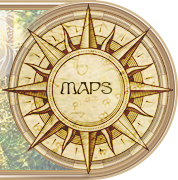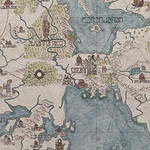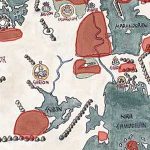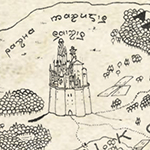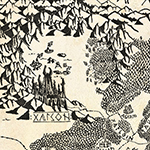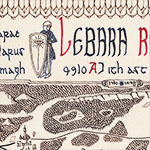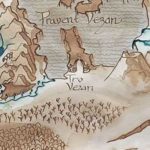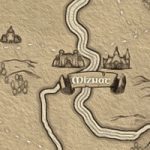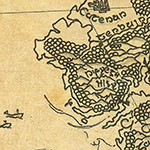The Archaics inhabit a plateau in the very core of the Siranian massive as well as the adjoining areas. They are a mysterious nation and guard their secrets jealously. Still, they do not shy away from visitors, whom they treat with respect. The following report was written by a traveller and explorer of the Empire, the professor at the University of Sirgon, Carduin Striand. He stayed with the Archaics for several years, studying their culture, which eventually left such an impression on him, he never returned to the civilization and instead remained in Archinara (the land of the Archaic) until his death, living according to their customs.

“…Their figures are tall and well build; on average, they are a head taller than regular men (this is why they are called ‘giants’). They are remarkably cold-hardy as they move around completely unclothed. In general, they spend a lot of time exercising, seeing to every muscle and nerve of their bodies until they control them perfectly. Both men and women are incredibly strong, resilient and agile. Whatever the women lack in physical strength, they more than compensate for with their speed, litheness and flexibility. Sometimes they go hunting but this is merely an exercise in speed and orientation since they do not eat meat. The animal, which they catch uniquely with their bare hands while moving on foot, is then released. They sleep in groups under the skies, the only hearts being their own bodies long accustomed to this way of living.
They live exclusively on fruit; sometimes they will eat herbs or leaves of some of the trees. Killing of an animal is considered equivalent to killing of a human being, just as the death of a tree equals a man’s demise. For it is the trees the Archaics treasure the most, cultivating them with tender care. The trees give them fruit and shelter; supposedly, the Archaics even converse with them. They also breed herds of peculiar mountain cattle, unknown to us in the lowlands, whose milk they drink but otherwise, their relationship with animals is rather symbiotic and there is little domestication. Similar tendencies are observable in their relationship with bees, whose language they speak. In exchange for some of their honey, the Archaics negotiate with hollow trees on their behalf, securing the hard-working insect favourable housing conditions.
They do not own houses, clothes, or tools, except those they occasionally put together and later discard. Besides cultivating trees and their own skills, they spend a lot of time studying. As they do not possess books, scrolls or anything we would call “culture”, they learn about nature, the human heart and soul and the forces of this and the nether world. There is a group of sages among them, who know the sacred teachings and other beneficial knowledge by heart, taking great care to preserve the tradition and to spread it among talented pupils, where it can grow. The climax of this mystical teaching is enlightenment, experienced by the adepts. An enlightened person is always recognized by his or her peers, and such an individual enjoys great respect.

The Archaics do not shy away from manifestations of feelings and emotions; they do not stifle them inside. Well-known is their heartbreaking weeping over cut-down trees or their infectious laughter that spreads easily among them. In their free time, apart from cultivating their bodies and minds, they often practice choral singing, which is more important to them than to other people. It brings the community closer together, releases thoughts and leads to spiritual unity. Their singing is the most sensitive and the innermost kind of vocalization known to us. They radically avoid using musical instruments, happily settling for sounds they can emit with mouths and fingers.
They enjoy close interpersonal relationships; private life, loneliness or abandonment being foreign to them. They live united into large families and lineages. They care deeply about their family relations as they place great importance in the inheritability of human characteristics and talents. Their sages determine which two individuals may beget a child and, by contrast, in which cases it is forbidden, thus cultivating certain qualities in people throughout centuries. Their life is very sociable as they have nothing to occupy themselves with except themselves, having all the time at their disposal. Storytelling is largely practised and well-liked; equal enjoyment is derived from new tales and stories. The Archaics know many mind games we wouldn’t even dream of, many riddles and conundrums based on language as well as spatial and logic imagination.
Their love life is very rich and colourful. It is customary to maintain a certain romantic relationship even between women, if they are close, or men, but the love act itself is reserved exclusively for the members of opposite genders. Any violent tendencies, simulations of torture or other love-life diversions often practised by bored aristocrats in the cities are considered a manifestation of degeneration or decadence, which in general goes against the Archaic culture and ethics. For in their own worldview, they are the forbearers of all mankind, and all the nations are descended from them through degeneration or decay, which is the loss of the completeness of humanness. In their moments of weakness, the Archaics dismiss others as “carrion eaters”, “blind people”, or “weaklings” and generally feel very proud of themselves, not seeing their haughty attitude as pride but as a perfectly objective assessment of the situation.
Though they consider themselves superior to other people, lives of other nations do not lose value in their eyes. Just as with the lives of animals and trees, the Archaics see others as worthy of care and protection; only they look at them as they might at somewhat backward relatives, lacking in both the physical and mental development, who never quite understood the meaning of real culture but instead keep losing time building fences and gathering useless things.

Similar to the Gandharians and Siranians, the Archaics do not bury their dead but instead cremate them. The burning pyre set on a barge is then sent over the water. If a child is born with a disability, it is put to sleep with a special herb and never wakes again. Those people who grow up and mature but still show signs of bodily or mental deviation not discernible in childhood are not killed but integrated into the society. The only restriction they face is the prohibition of intercourse (between a man and a woman) with the purpose of begetting children.
Their courts are formed by the elders, the wise sages of the individual families. There are no laws, only the memory of tradition. The usual punishment for a simple offence is a public confession in front of the entire community: the case is talked over in a friendly manner, the wise offer their words, the causes and effects are discussed. If the offence is great indeed, the court decides on some sort of punishment, which is generally clearly related to the nature of the case. A more severe form of punishment is being exiled for a week, a month, or a year, so the individual will know loneliness and have time to ponder everything he or she has done.
If someone doesn’t like the system of government or disagrees with the established customs and traditions, they can simply leave. Nevertheless, no one sensible will do that since the Archaic society is universally considered ideal while other nations are seen as its degenerated descendants.
However, if a person stays away for more than a year, they can no longer return. Many people come back in less than six months.
At the same time, exile – or departing – from the community is the greatest punishment accorded by their law. An exiled person does not have the “right of one year” and can no longer return. The leave-taking is gone about in a friendly but mournful manner since to the Archaics departing beyond the borders of their land equals death.
There is no place for foreigners in their society. Pilgrims and travellers are welcomed with kindness but no one is allowed to settle here permanently nor fully accepted since any affiliation is based on family ties.
Without the borders of the country of the Ancient Archaics live smaller nations closely related to them. They follow most of the traditions of the Ancient ones but there are exceptions: the Digambos are not completely naked but wear a loin-cloth, the Svetambos from the Akis peninsula even wear flowing togas, the Melambos have books and scrolls, the Atnir use metal weapons, the Nigantar have property (though it is scarce), the Svargantians under Mount Svargas live in houses and so on. These tribes speak the language of the Old ones (Sthaviri ) among themselves and have no difficulty learning it since their own mother-tongues are closely related to it.“
We think the conclusion of Striand’s treatise is sufficiently illustrative and as such does not require commentary. We can only add that in the outside world, the civilized part of the Siranian Empire, the Archaics are called the Giants, the Primitives, the Savages, or the Barbarians.
